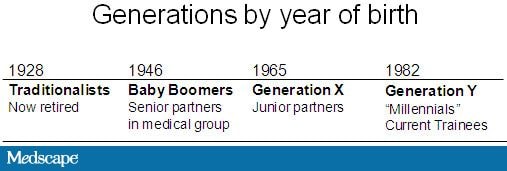Training of Generation Y
In an interesting article published in Medscape on Training the Physician and the Anesthesiologist of the Future by Alex Macario, MD, MBA the training program of anesthesiologists is presented.

Figure 1. Factors that influence the changing physician workforce.
However I am more interested in the way he discerns the different demographic of the various groups of people involved in the training. This has relevance not only in the training of physicians but also of other areas including theological education. 
Figure 2. Recent generations by year of birth.
Alex Macario's study is focused on the United States but his characteristics of Generation Y is fascinating and will be useful for educators elsewhere in the world.
Table 1. Characteristics of the Millennial Generation
| Largest generation of young people in the country's history, likely surpassing the aging baby boom generation (78 million)[3] |
| Economically, they may not be better off than their doting parents, especially after the 2008 worldwide financial crisis |
| The most ethnically and racially diverse cohort of youth in United States history: 60% (a record low) are white, 19% are Hispanic, 14% black, 4% Asian; and 3% are mixed race or other.[4] They are comfortable with heterogeneity in living arrangement or socioeconomic class |
| Team-oriented, banding together to socialize rather than pairing off, acting as each other's resources or peer mentors |
| Civic-minded with a desire to make a positive contribution to society and to the health of the planet[5] |
| Have been spurred to achievement and display a self-confidence that reflects their being raised in a child-centered world |
| Comfortable with Web communications, media, and digital technologies (eg, Facebook, YouTube, Google and Wikipedia) |
| Easier social communication through technology may explain the reputation of the millennial generation for being peer-oriented |
| Accelerating technologic change may create shorter generations, as young people just a few years apart have different experiences with technology[6] |
| Increased global exposure through the Web, leading students and residents in record numbers to seek international educational experiences |
| Many millennials (42% of women and 30% of men) talk to their parents every day and many are still financially dependent on their parents; this has led to a new acronym: KIPPERS (Kids in Parents' Pockets Eroding Retirement Savings).[7] As the skills required for certain jobs become more specialized, many young people return to school for professional degrees with the hope that this additional training will help them land a job. This creates more dependence on others, such as their parents, for financial support. |
Education and training in the present have to be designed to factor in the demographic of the millennials if these programs are to be successful.
Worth thinking about.
.
Labels: Christian education, Education, Learning, Medical Education, Medical Students, Theological education















0 Comments:
Post a Comment
<< Home